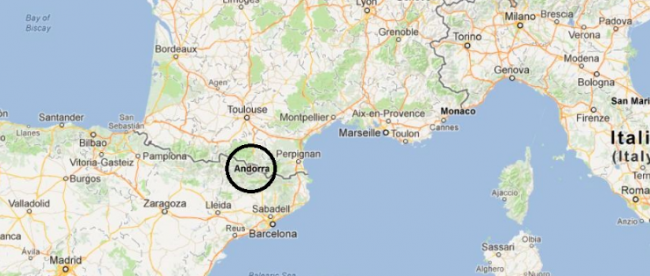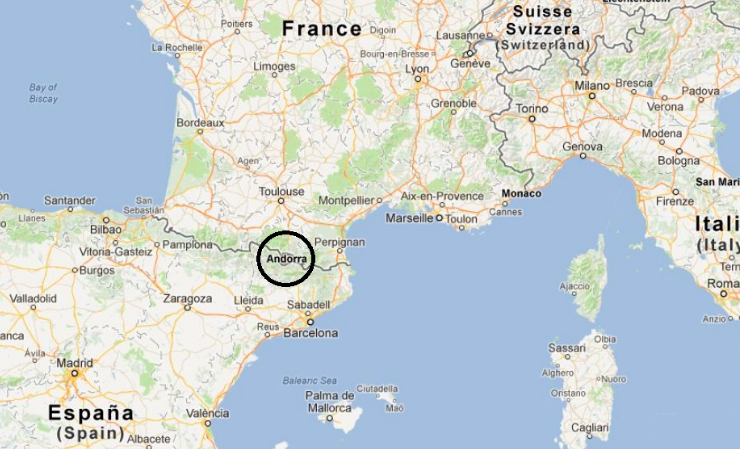How to Become Half a Prince


Andorra is a tiny country of about 180 square miles (approximately 465 km^2) which sits on what otherwise would be the border between France and Spain. It is home to just over 75,000 citizens although the actual number of people within its borders is typically quite higher due to ski tourism — more than 10 million people visit the micronation each year. This and a lot of favorable tax laws (for those with means and the desire to avoid taxes, at least) buoys the country’s economy, and the overall results are striking — Andorra boasts life-expectancy rates among the world’s highest and unemployment around the lowest.
And if you play your cards right, you can become the Half-Prince of Andorra.
Or something like that. It’s as complicated as Andorra’s history, a mess created by generations of feudalism. Most likely, Andorra got its start as a proper city-state when the Holy Roman Emperor Charlemagne granted its people a charter as a thank you for their efforts in fighting the Moors sometime in the late 700s. Along the way, Andorra became part of the territory ruled by a feudal lord known as Count of Urgell, the head of a nearby Catalan county (which itself ultimately folded into Spain in the 1400s). The lord of Urgell’s dominion over Andorra was short-lived, though; a subsequent Count traded Andorra to the Bishop of Urgell — the head of the Catholic church in the area — in the year 988. A century later, though, a new Count of Urgell tried to reverse that decision; he decided he wanted to take Andorra back from the Bishop.
This, again, was medieval times, and it wasn’t like the Bishop could go to some sort of judge, say “we had a deal!,” and expect everything to work itself out. Might made right and the Count’s ambition meant war, and war required armies — and the Bishop didn’t have one of those. So he found a friend who did — another Catalan nobleman, the Lord of Caboet. The Bishop didn’t have much to give, though, so he got creative and offered to share sovereignty over Andorra in exchange for protection. The deal worked — the Count of Urgell decided that forcibly taking back Andorra wasn’t worth it. Instead, the micronation became the land of two princes.
What kept Andorra independent, though, required some feudal house-combining marriages. The Lord of Caboet who acquired a one-half interest in the Andorran throne had a daughter, who got married to some other feudal lord and had a daughter of her own. That child ended up marrying the Count of Foix, a French noble. This united the houses of Caboet and Foix, giving future France as much of a stake in Andorra as future Spain. As a result, neither nation ultimately annexed the tiny ski villa on its shared border, as it would have upset the other. And neither France nor Spain wanted to go to war over Andorra. Today, Andorra remains an independent nation, ruled by two princes.
That’s great and all, but you still want to know how you can become one of those princes, right? There are two ways, and the good news is that it doesn’t matter if you were born a royal or not — and you don’t even need to live in Andorra.
The first way is to become the Bishop of Urgell. That role still exists, but it’s probably the harder route — you need to be Catholic and the Pope has to appoint you to the role. The easier way is to take the half entitled to the Count of Foix. That position is long gone — it, like other medieval titles, folded into the French throne centuries ago. For generations, whenever France coronated a new king, that ruler also assumed the role of co-prince of Andorra. But as Vogue notes, with the French monarchy now a thing of the past, that honorific now falls to the duly elected head of state, the President of France. Today, that’s Emmanuel Macron, but in the future, it could be you — just win the election.
Or in other words, if you want to be a half a prince, step one is to become a French politician. Or become close with the Pope.
Bonus fact: The co-princes of Andorra don’t have much power — the positions are mostly ceremonial. But before Andorra enacted its first-ever constitution in 1993, the princes were compensated for their duties anyway. The salary, if you can call it that, was carried over from centuries beforehand and never really accounted for inflation. As the Independent (UK) reported, “Andorra paid a tribute of approximately $460 (£353) to the French ruler on odd-numbered years, and a tribute of approximately $12 (£9) to the Spanish bishop, plus six hams, six cheeses, and six live chickens on even-numbered years.”
From the Archives: Leasing the Kingdom: Andorra isn’t the only European micronation. Liechtenstein is another, and it’s a lot smaller geographically and population-wise. And you can rent it. Yes, the whole nation.
